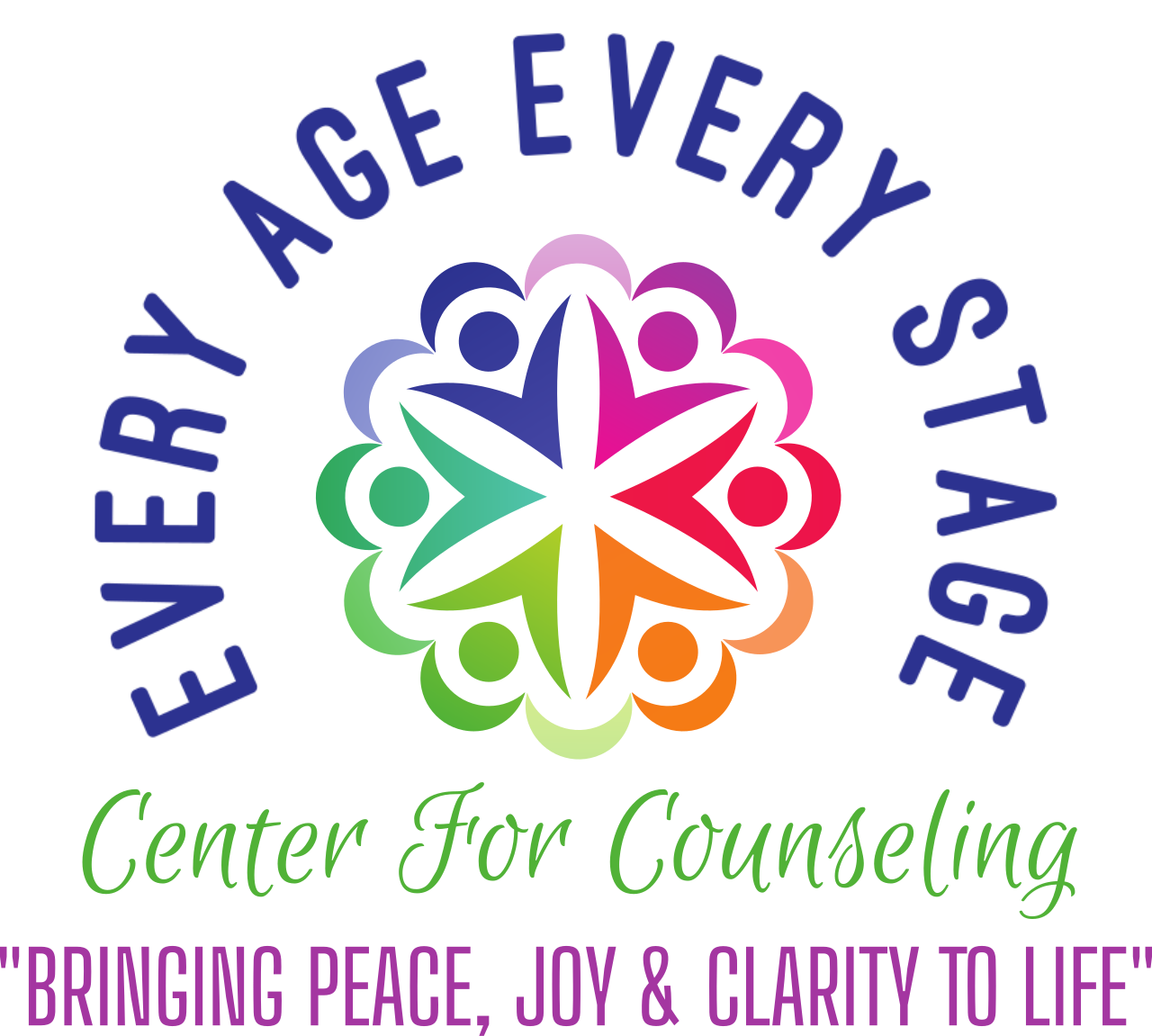every age every stage
Center For Counseling
FAQ's
-
I CAN USUALLY HANDLE MY OWN PROBLEMS. WHY WOULD I NEED THERAPY?
While it's true that many people are able to handle their own problems and challenges,
therapy can be helpful in a number of ways:
- Gain a new perspective: Talking to a therapist can provide you with a new perspective on your problems and challenges, which can help you see things in a different light and develop new insights and solutions.
- Improve coping skills: A therapist can help you develop new coping skills to deal with stress, anxiety, and other challenges in your life.
- Identify patterns: Therapy can help you identify patterns in your thoughts, behaviors, and relationships that may be contributing to your problems, and develop strategies to change them.
- Support and validation: A therapist can provide emotional support and validation, which can be especially helpful during difficult times.
- Address deeper issues: Sometimes, the problems we face in our lives are rooted in deeper emotional or psychological issues that can benefit from the support and guidance of a trained therapist.
- Prevent future problems: Therapy can also be a preventative measure, helping individuals develop the skills and resilience needed to avoid future problems and cope with any challenges that may arise.
It's important to remember that seeking therapy does not mean you are weak or incapable of
handling your own problems. In fact, it takes strength and courage to seek help when you need
it. Therapy can be a valuable tool for personal growth and development, and can help
individuals lead happier, more fulfilling lives.
-
How can therapy help me?
Therapy can benefit you in a variety of ways, depending on your individual needs and goals.
Here are some of the potential benefits of therapy:
- Improved mental health: Therapy can help alleviate symptoms of mental health conditions such as anxiety, depression, and post-traumatic stress disorder (PTSD).
- Increased self-awareness: Therapy can help you gain a better understanding of yourself, your thoughts, emotions, and behaviors, which can lead to increased self-awareness and personal growth.
- Better coping skills: Therapy can help you learn new coping skills and strategies to deal with difficult emotions and situations.
- Improved relationships: Therapy can help you improve communication and resolve conflicts in your relationships, whether it's with family, friends, or romantic partners.
- Increased resilience: Therapy can help you build resilience by teaching you how to bounce back from setbacks and challenges.
- Enhanced self-esteem: Therapy can help you develop a more positive self-image and increase your self-esteem.
- Personal growth: Therapy can help you work towards personal growth and self-improvement, whether it's in your career, relationships, or other areas of your life.
Overall, therapy can be a valuable tool for improving your mental health, increasing self-
awareness, building resilience, and achieving personal growth. By working with a therapist, you
can develop new skills and strategies to navigate life's challenges and build a more fulfilling and
satisfying life.
-
WHEN SHOULD I SEEK THERAPY?
It can be difficult to determine when to seek therapy, as everyone's experiences and needs are
unique. However, here are some common symptoms that may indicate that it's time to
consider therapy:
- Persistent sadness, anxiety, or worry: If you are feeling sad or anxious most of the time, or if these emotions are interfering with your daily life, it may be helpful to talk to a therapist.
- Difficulty coping with stress: If you are finding it hard to manage stress, or if stress is interfering with your ability to work, study, or maintain relationships, therapy can provide you with coping skills and strategies to manage stress more effectively.
- Changes in mood or behavior: If you notice significant changes in your mood, behavior, or personality, such as increased irritability or withdrawal from social activities, therapy may be beneficial.
- Struggles with relationships: If you are experiencing difficulties in your relationships, such as communication problems, conflict, or trust issues, therapy can help you improve your relationships and build stronger connections with others.
- Trauma or grief: If you have experienced a traumatic event or are struggling with grief or loss, therapy can provide you with a safe and supportive environment to process your emotions and work through your feelings.
- Substance abuse or addiction: If you are struggling with substance abuse or addiction, therapy can help you overcome these challenges and develop a healthier lifestyle.
Ultimately, if you feel like you are struggling with any aspect of your mental health or well-
being, seeking the help of a therapist can be a positive step towards healing and personal
growth.
-
WHAT ARE THE DIFFERENCES BETWEEN THE MENTAL HEALTH PROFESSIONALS?
There are several different types of mental health professionals, each with their own unique
training and qualifications. Here is a brief overview of some of the most common types:
- Resident in Counseling (RIC): A Resident in Counseling is a mental health professional who has completed a graduate degree in counseling or a related field and is completing supervised clinical hours to obtain a license. They are not yet licensed, but are working under the supervision of a licensed professional.
- Licensed Professional Counselor (LPC): An LPC is a mental health professional who has completed a graduate degree in counseling or a related field and has passed a state licensing exam. They provide individual and group counseling to help clients with a variety of mental health issues.
- Licensed Clinical Social Worker (LCSW): An LCSW is a mental health professional who has completed a graduate degree in social work and has passed a state licensing exam. They provide therapy and counseling to individuals, families, and groups, and often focus on helping clients navigate social and environmental factors that may be impacting their mental health.
- Psychiatric Nurse Practitioner (PMHNP): A PMHNP is a registered nurse with additional training in psychiatric mental health who has completed a graduate degree and is licensed to provide mental health care services, including assessment, diagnosis, and medication management.
- Psychologist: A psychologist is a mental health professional who has completed a doctoral degree in psychology and has passed a state licensing exam. They provide therapy, counseling, and assessment services, and often specialize in working with specific populations or mental health issues.
- Psychiatrist: A psychiatrist is a medical doctor who specializes in mental health. They can diagnose and treat mental health conditions, and may prescribe medication to help manage symptoms.
The main differences between these professionals are their training, qualifications, and scope
of practice. RICs, LPCs, and LCSWs provide counseling and therapy services, while PMHNPs and
psychiatrists can also prescribe medication to manage symptoms. Psychologists typically
provide therapy and assessment services, but cannot prescribe medication. Additionally,
psychiatrists have completed medical training and can also provide medical care for mental
health conditions. When seeking mental health care, it's important to consider your individual
needs and preferences and find a professional who is the best fit for you.
-
WHAT SHOULD I LOOK FOR IN A MENTAL HEALTH PROFESSIONAL?
When looking for a mental health professional, it is important to consider several factors to find
a therapist that is a good fit for you.
Here are some things to look for and questions to ask:
1. Credentials and Experience:
- What is your educational background and training?
- What licenses and certifications do you have
- How long have you been practicing?
- Do you have experience working with my particular concerns or issues?
2. Treatment Approach:
- What is your approach to therapy?
- How do you typically work with clients?
- What techniques or interventions do you use
- Are you open to incorporating my cultural or spiritual beliefs into treatment?
3. Availability and Accessibility:
- What is your availability for appointments?
- How long are sessions, and how often will we meet?
- How do you handle emergencies or crises outside of regular hours?
- Do you offer teletherapy or other virtual options?
4. Cost and Insurance:
- What are your fees per session?
- Do you accept insurance, and if so, what types?
- Do you offer a sliding fee scale or other payment options?
5. Personal Connection:
- How do you build rapport with clients?
- Can you describe your communication style?
- Do you have experience working with clients from my cultural or demographic background?
- Have you worked with clients who have similar experiences or concerns as me?
Remember, it is important to find a mental health professional who you feel comfortable
working with and who has experience and expertise in addressing your specific concerns.
Don't be afraid to ask questions and shop around until you find a therapist who is the right fit for you.
-
WHAT IS THERAPY LIKE? HOW DO I FIND A THERAPIST THAT IS RIGHT FOR ME?
Therapy can vary depending on the therapist's approach and the needs of the individual, but
generally speaking, therapy involves talking with a licensed mental health professional in a safe
and confidential setting.
The therapist will ask questions to gain a better understanding of the
individual's challenges and experiences, and work with them to develop coping strategies and
solutions. Some therapy sessions may involve specific techniques, such as cognitive-behavioral
therapy or mindfulness practices, while others may focus more on exploring and processing
emotions.
Finding a therapist that is right for you can take some effort, but it's important to find someone
who you feel comfortable with and who has the expertise to help you with your specific needs.
Here are some tips to help you find a therapist:
- Ask for recommendations: Talk to friends, family members, or your primary care physician for recommendations of therapists they have worked with and trust.
- Check online directories: There are many online directories of licensed therapists that you can use to find someone in your area. Websites like Psychology Today or GoodTherapy.org allow you to search for therapists by location, specialties, and other criteria.
- Consider the therapist's approach: Research the different therapy approaches to find one that resonates with you. If you're not sure, try contacting a few therapists to get a sense of their approach.
- Check for licensing and credentials: Make sure the therapist you choose is licensed and has the appropriate credentials to provide therapy in your state.
- Schedule a consultation: Many therapists offer a free consultation session to help you get to know them and determine if they are a good fit for you.
It's important to remember that finding the right therapist may take time, and it's okay to try a
few different therapists before finding one that is the right fit for you. A good therapist should
be someone you feel comfortable talking to and who has the expertise to help you with your
specific challenges.
-
WHAT ABOUT MEDICATION VS THERAPY? DO THEY WORK TOGETHER?
Medication and therapy are two different approaches to treating mental health conditions,
but they can work together to provide comprehensive treatment. Medication is often used to help manage
symptoms of mental health conditions, while therapy helps individuals learn coping strategies and address
underlying issues that contribute to their challenges.
While medication can be helpful in managing symptoms, it does not address the root cause of
the problem. Therapy, on the other hand, can help individuals develop coping skills and work
through the underlying issues that contribute to their symptoms. In some cases, therapy may
even help an individual reduce or eliminate their need for medication.
The decision to use medication, therapy, or both is often based on an individual's specific needs
and the recommendations of their healthcare provider. It's important to work closely with your
healthcare provider to determine the best course of treatment for you.
In many cases, medication and therapy are used together to provide comprehensive treatment.
For example, an individual with depression may take medication to manage their symptoms
while also attending therapy to address underlying issues and develop coping strategies. The
combination of medication and therapy can be especially effective in managing certain
conditions, such as anxiety disorders and mood disorders.
It's important to note that medication and therapy are not always necessary for everyone and
that there is no one-size-fits-all approach to mental health treatment. The best course of
treatment will vary depending on an individual's specific needs and circumstances, and it's
important to work with a healthcare provider to develop a personalized treatment plan.
-
WILL MY THERAPY SESSIONS BE CONFIDENTIAL?
Yes, confidentiality is a fundamental part of the therapeutic relationship. In general, what you
discuss in therapy is kept confidential and your therapist is legally and ethically required to
maintain confidentiality and protect your privacy. This means that your therapist cannot
disclose any information about your treatment to anyone without your permission, except in
certain limited circumstances.
There are some situations in which a therapist may be required to break confidentiality, such as
if you pose a threat to yourself or others, if there is suspected child, or elder abuse or neglect,
or if a court orders the therapist to disclose information.
However, your therapist should explain these limitations of confidentiality to you during your
first session and obtain your informed consent to treatment, which includes a discussion of
confidentiality.
It's important to note that there are some limitations to confidentiality when it comes to
insurance and billing. For example, your insurance company may require information about
your diagnosis or treatment plan in order to process claims. However, your therapist should
only disclose the minimum amount of information necessary for billing purposes and should
make every effort to protect your privacy.
Overall, confidentiality is a central aspect of therapy and your therapist should take great care
to protect your privacy and keep your information confidential, except in the limited
circumstances where they are legally or ethically required to disclose information.
-
WILL MY INSURANCE COVER THE COST OF MY THERAPY SESSIONS?
Whether or not your insurance will cover the cost of your therapy sessions depends on a variety
of factors, including the type of insurance you have, the specific mental health services you
need, and the qualifications of the therapist you choose.
Most insurance plans cover some form of mental health services, including therapy, but the
amount and type of coverage can vary widely. Some insurance plans require a co-pay or
deductible, while others may cover a certain number of sessions per year or only certain types
of therapy. Additionally, some plans may limit the number of sessions you can have in a given
time period or require pre-authorization before you can start therapy.
Before beginning therapy, it's important to check with your insurance provider to understand
your mental health benefits and what is covered. You can also ask your therapist about their
experience working with insurance companies and whether they accept your insurance plan.
If you find that your insurance does not cover therapy or you are not comfortable using your
insurance, you may want to consider other options, such as sliding-scale fees or therapy
provided through community clinics or other organizations.
Overall, understanding your insurance coverage is an important part of starting therapy, and it's
important to have a clear understanding of what services are covered and what your out-of-
pocket costs may be.
-
Mental Health Disorders & Resources
500 FREE ONLINE MENTAL HEALTH ASSESSMENTS
ADDICTION
https://www.addictionresource.net/
ANXIETY
https://www.nimh.nih.gov/health/topics/anxiety-disorders
ATTENTION DEFICIET DISORDERS
https://www.nimh.nih.gov/health/topics/attention-deficit-hyperactivity-disorder-adhd
AUTISM SPECTRUM DISORDER
https://www.nimh.nih.gov/health/topics/autism-spectrum-disorders-asd
BIPOLAR DISORDER
https://www.nimh.nih.gov/health/topics/bipolar-disorder
BORDERLINE PERSONALITY DISORDER
https://www.nimh.nih.gov/health/topics/borderline-personality-disorder
DEPRESSION
https://www.nimh.nih.gov/health/topics/depression
EATING DISORDERS
https://www.nimh.nih.gov/health/topics/eating-disorders
LGBTQ+ FOR COLLEGE STUDENTS
https://www.upromise.com/articles/lgbtq-resources-for-college-students/
OBSESSIVE COMPULSIVE DISORDER
https://www.nimh.nih.gov/health/topics/obsessive-compulsive-disorder-ocd
POST TRAUMATIC STRESS DISORDER
https://www.nimh.nih.gov/health/topics/post-traumatic-stress-disorder-ptsd
SUBSTANCE USE DISORDER
https://www.nimh.nih.gov/health/topics/substance-use-and-mental-health
SUICIDE PREVENTION
https://www.nimh.nih.gov/health/topics/suicide-prevention
TRAUMATIC EVENTS
https://www.nimh.nih.gov/health/topics/coping-with-traumatic-events
Suicide: resources for those experiencing thoughts of self-harM:
*remember, suicide is a permanent solution to a temporary problem. help is available! please hold on!
Suicide Prevention/Depression Support
- US: Hopeline (Suicide Prevention) : 1-800-SUICIDE (1-800-784-2433)
- US: Suicide Hotline: 1-800-273-Talk (1-800-8255)
- UK: Samaritans (Nat’l and local): 08457 90 90 90 or jo@samaritans.org
- CAN: Suicide Prevention Canada
- AUS: Lifeline Australia Helpline 13 11 14
ARTICLES:
How to tell someone I want to kill myself
"My son has admitted he is suicidal. What do I do now?"
So why do kids no tell parents they are suicidal?
How can we intervene online when people have lost all hope?
Anne Moss Rogers Suicide Resource Page
This page contains resources for coping with suicidal ideation, suicide prevention
self-help, coping with suicide loss, and helpful apps to prevent suicide
Suicide prevention self-help
Podcast for men who struggle with suicide
SUICIDE PREVENTION SELF-HELP BOOKS:
Book - "How I Stayed Alive When My Brain Was Trying to Kill Me: One Person's Guide to Suicide Prevention"
Book - "The Suicidal Workbook: CBT Skills to Reduce Emotional Pain, Increase Hope, and Prevent Suicide"
For Men:
"Guts, Grit & The Grind: A MENtal Mechanics MANual: Basic Mechanics"
Local Help
WARMLINES: Assistance for Peer Support That Are NOT in Immediate Crisis
- Mental Health Of America Peer Warmline Virginia 1-866-400-6428
- Virginia Warmline Flyer
- Alive RVA (Peer Support for those struggling with Addiction) 1-833-473-3782
LOCAL COMMUNITY SERVICES BOARDS:
- Chesterfield: 804-748-6356
- District 19: 804-862-8000
- Goochland/Powhatan: 804-556-3716/804-598-2697
- Hanover: 804-365-4200
- Henrico: 804-727-8484
- Charles City/New Kent Residents: 877-264-8484
- Richmond:
804-819-4100
mental health resources

Assistance for peer support that are not in immediate crisis
- Mental Health Of America Peer Warmline Virginia 1-866-400-6428
- Virginia Warmline Flyer
- Alive RVA (Peer Support for those struggling with Addiction) 1-833-473-3782

Local Community Services Boards
- Chesterfield: 804-748-6356
- District 19: 804-862-8000
- Goochland/Powhatan: 804-556-3716/804-598-2697
- Hanover: 804-365-4200
- Henrico: 804-727-8484
- Charles City/New Kent Residents: 877-264-8484
- Richmond: 804-819-4100

Suicide Prevention/Depression Support
- US: Hopeline (Suicide Prevention) : 1-800-SUICIDE (1-800-784-2433)
- US: Suicide Hotline: 1-800-273-Talk (1-800-8255)
- UK: Samaritans (Nat’l and local): 08457 90 90 90 or jo@samaritans.org
- CAN: Suicide Prevention Canada
- AUS: Lifeline Australia Helpline 13 11 14

Substance Abuse/Alcoholism
- US: National Drug Information Treatment and Referral Hotline: 1-800-662-HELP (4357)
- US: Alcohol Abuse and Crisis Intervention: 1-800-234-0246
- US: National Cocaine Hotline: 1-800-COCAINE (262-2463)
- US: Al-Anon/Alateen Hotline (for friends and family) 1-800-344-2666
- UK: Drinkline: Nat’l. Alcoholism Helpline : 0800 917 8282
- AUS: Drug & Alcohol Helpline 1800 198 024
- CAN: Drug & Alcohol Helpline 1-800-565-8603
- Alcoholics Anonymous (AA) – Alcoholics Anonymous is an informal meeting society for recovering alcoholics whose primary purpose is to stay sober and help other alcoholics achieve sobriety.
- Narcotics Anonymous (NA) – Narcotics Anonymous similar to AA, is an international, community-based association of recovering addicts.

Rape, Abuse & Domestic Violence
- US: Childhelp (Child Abuse) : 1-800-4ACHILD (1-800-422-4453)
- US: Nat’l. Domestic Violence Hotline : 1-800-799-SAFE (7233)
- US: RAINN Nat’l. Sexual Assault Hotline: 1-800-656-HOPE (4673)
- US: Nat’l. Center on Elder Abuse : 1-800-677-1116
- US: National Runaway Switchboard: 1-800-621-4000
- UK: Women’s Aid Domestic Violence Helpline: 0808 2000 247
- Global Domestic Violence Resource Guide

LGBTQIA+
- US: LGBT National Help Center 1-888-843-4564
- UK: Galop – LGBT Abuse Helpline 0800 999 5428
- CAN: PFLAG Canada Helpline 1-888-530-6777
- AUS: QLIFE Australia Helpline 1800 184 527

Pregnancy/Sexual Health
- US: Planned Parenthood: 1-800-230-PLAN (7526)
- US: Nat’l. STD Hotline : 1-800-227-8922
- US: National AIDS Hotline: 1-800-342-AIDS (2437)
- US: The Teen AIDS Hotline: 1-800-440-TEEN (8336)
MEDICAL EMERGENCIES:
- US: Nat’l. Poison Help : 1-800-222-1222

Additional Resources/Organizations
ADDITIONAL RESOURCES/ORGANIZATIONS:
- ULifeline – A directory of resources available for college students— take a self-assessment test; or find your college psych services center.
- Alcoholics Anonymous (AA) – Alcoholics Anonymous is an informal meeting society for recovering alcoholics whose primary purpose is to stay sober and help other alcoholics achieve sobriety.
- Narcotics Anonymous (NA) – Narcotics Anonymous similar to AA, is an international, community-based association of recovering addicts.
- Self-Mutilators Anonymous – A community-based association for individuals struggling with self-mutilation.
INFORMATIONAL RESOURCES:
- National Institute of Mental Health – Extensive information on a variety of mental health topics.
- National Institute of Health – Extensive information on all health related topics.
- MedlinePlus – Extensive information of different drugs and treatment options.
- PsychCentral - Additional Hotline Directory including phone numbers, apps for assistance, and more.
- PleaseLive.Org - Additional Hotline Directory including phone numbers, apps for assistance, and more.
Copyright © 2024 Every Age Every Stage, LLC - All rights reserved. Website designed by Ropelato Consulting
